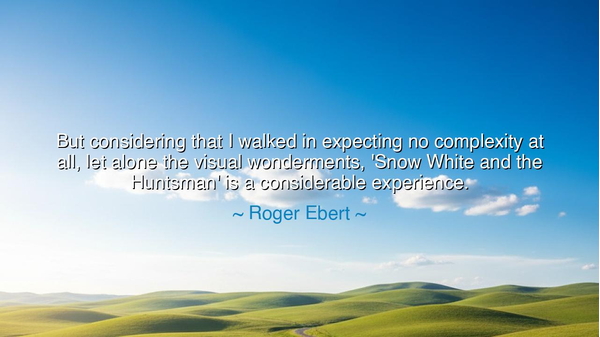
But considering that I walked in expecting no complexity at all
But considering that I walked in expecting no complexity at all, let alone the visual wonderments, 'Snow White and the Huntsman' is a considerable experience.






“But considering that I walked in expecting no complexity at all, let alone the visual wonderments, ‘Snow White and the Huntsman’ is a considerable experience.” Thus spoke Roger Ebert, the sage of cinema, whose pen revealed not only the measure of film, but the measure of the human heart. His words, though humble, shine with a deeper truth — a truth about expectation and discovery, about the moments when life, against all odds, reveals beauty where we assumed there would be none. For Ebert, this was not simply a review of a motion picture, but a reflection on the nature of openness — that sacred willingness to encounter the unknown without prejudice, and to be surprised by wonder.
The origin of this quote lies in Ebert’s review of Snow White and the Huntsman, a film he approached with little hope of depth or artistry. He expected a simple spectacle — a reimagining of a fairy tale that the world had long since worn threadbare. Yet what he found instead was something that exceeded his cynicism: a world of visual majesty, crafted with care, imbued with emotion, and touched by imagination. In confessing his surprise, Ebert does something rare and noble — he admits that his expectations were mistaken. And in doing so, he transforms a review into a moral revelation.
For beneath his words lies a lesson that transcends the silver screen. How often do we approach life itself as Ebert approached that film — weary, skeptical, expecting little from the world? We shield our hearts with irony and indifference, believing we have seen it all, and thus deny ourselves the joy of being astonished. Yet when we release these defenses, when we step into experience without the burden of cynicism, life reveals its hidden wonderments. Just as Ebert discovered unexpected beauty in a film he had dismissed, so too can we rediscover beauty in the ordinary — in a stranger’s kindness, in a sunset long ignored, in the stories we thought we already knew.
The ancients understood this truth well. The philosopher Heraclitus taught that “you cannot step into the same river twice,” for both you and the river are always changing. So it is with art, with life, with love — what seems simple or predictable often conceals endless depth, if only we approach it with humility. The mind closed by expectation sees only repetition; the mind opened by curiosity finds the infinite in all things. In Ebert’s experience, we glimpse the spirit of this ancient wisdom: that the unexpected revelation is one of life’s greatest gifts, and that the soul grows each time it allows itself to be surprised.
History, too, offers its lessons. Consider the story of Galileo Galilei, who turned his telescope to the night sky expecting to see the familiar order of celestial perfection. Instead, he found mountains on the moon, moons orbiting Jupiter, and imperfections in the very heavens themselves. What he had believed to be simple and pure was, in truth, vast and complex beyond imagining. His willingness to see what was there, rather than what he expected to see, changed humanity’s understanding of the cosmos forever. Ebert’s discovery, though humbler in scope, belongs to the same lineage of insight — the recognition that the world continually exceeds our imagination when we meet it with wonder rather than judgment.
Thus, the lesson of this quote reaches far beyond cinema. It teaches that to live well is to remain teachable — to let every experience, no matter how small or familiar, have the power to surprise us. The wise do not walk through the world assuming mastery; they walk in awe. To “expect no complexity” is to prepare the heart for delight, for when beauty comes unbidden, it pierces deeper than any anticipated pleasure. The gift of surprise humbles the intellect and awakens the soul.
Therefore, my friends, let this teaching take root in you: approach the world not as a critic expecting disappointment, but as a seeker expecting discovery. Lay aside the armor of cynicism. Step into each day as Ebert stepped into that theater — open, uncertain, and ready to be moved. For life, like art, hides its treasures behind the veil of expectation, waiting for those who still possess the courage to wonder.
And when you find yourself astonished — when the world, or a story, or a person reveals more beauty than you had foreseen — give thanks. For in that moment, as Roger Ebert once did, you are reminded that even in a weary age, the heart can still be surprised, and the world, when viewed without prejudice, remains — ever and always — a “considerable experience.”






AAdministratorAdministrator
Welcome, honored guests. Please leave a comment, we will respond soon